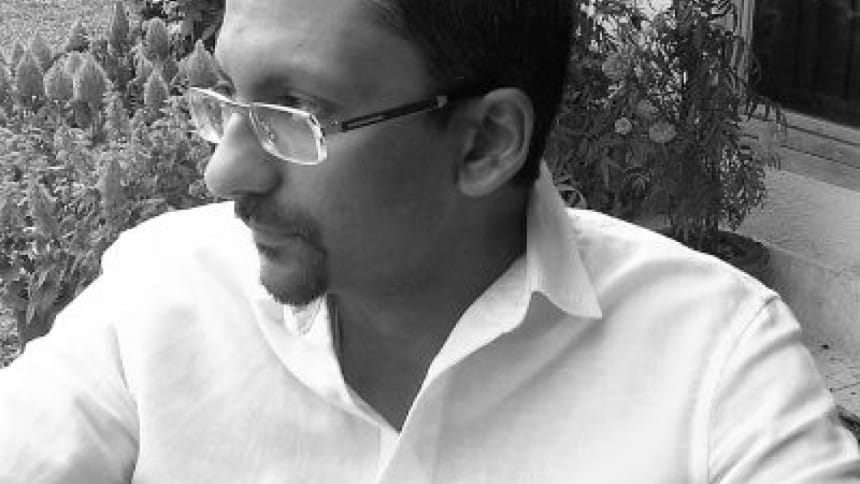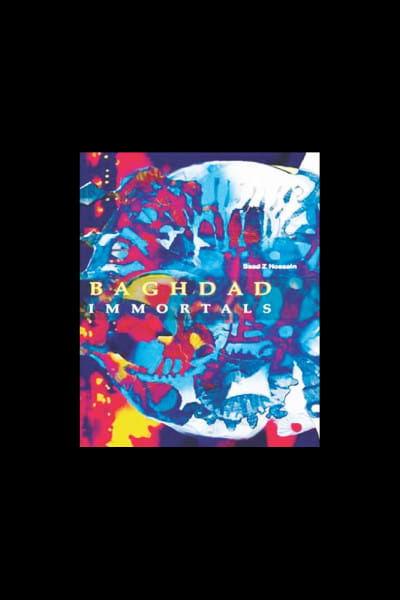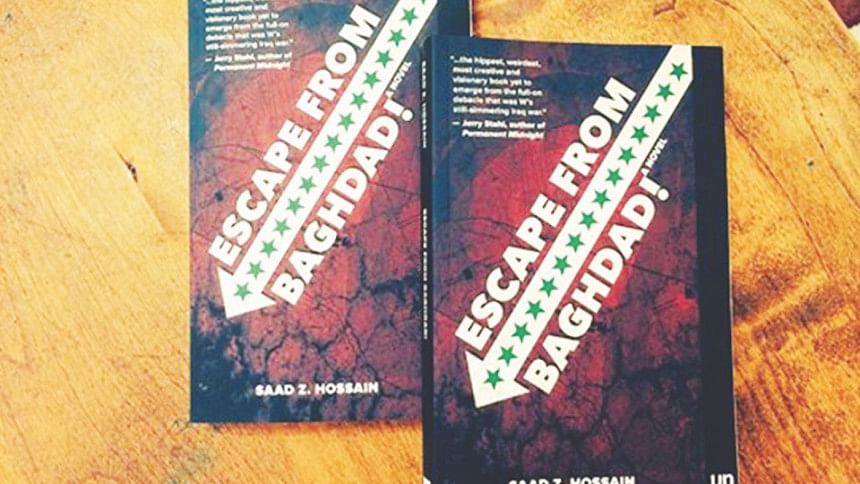Fantasizing in Dhaka traffic: An interview with Saad Z. Hossain

Saad Z. Hossain writes in a niche genre of fantasy, science fiction and black comedy with an action-adventure twist. He was published in the anthologies What the Ink? and Six Seasons Review. He has written numerous articles and short stories for The Daily Star, New Age, and the Dhaka Tribune, the top English daily newspapers in Bangladesh. His debut novel Baghdad Immortals was published by Bengal Publications and launched at Hay Dhaka 2013. It was then taken up by an independent publisher, Unnamed Press, in USA. A revised edition of his novel, renamed Escape From Baghdad! was released in March 2015.
The novel is set in Baghdad in the immediate aftermath of the US invasion. A desperate American military with no discernible understanding of the complex cultural differences in Iraq has created a power vacuum that needs to be filled. Religious fanatics, mercenaries, occultists, and American soldiers are all vying for power. In the chaos of a city without rule, getting out of Baghdad is no easy task. Anti-heroes Dagr - a former economics professor, and Kinza - a streetwise hoodlum, become embroiled in a mystery surrounding an ancient watch that makes it imperative to escape. With a satiric eye firmly cast on the absurdity of human violence, Escape from Baghdad! is a hilarious look into what happens when the wrong people are present at the right time in an iffy place.

SLR caught up with the talented Saad Z. Hossain to find out more about how the plot thickens in the madness of Dhaka traffic; his choice of fantasy over any other fiction; and the importance of people taking a chance on you.
A gonzo adventure novel that shreds the conventional wisdom that pulp can be pigeonholed." — Kirkus Reviews
I loved this book an unreasonable amount… A madcap black comedy, this one is not to be missed. — Liberty Hardy, Bookriot
SLR: When and why did you begin writing?
SZH: I started reading for fun at a young age. There wasn't any good television or video games or Internet, so for a solitary person, it was a major source of entertainment. The writing just kind of followed. At some point I got a computer, but it operated on floppy disks and had no games or anything, so pretty much all I could do on it was write. By this time I was writing a couple of hours a day. In middle school, we started a collaborative fantasy novel with some of my friends, where we each picked a character and wrote chapters. It's a lost masterpiece. My friend Andrew stole it and took it to Australia.
SLR: How does a Bangladeshi come up with a urban fantasy story based in Baghdad? What inspired you to write this?
SZH: It started as a writing exercise a couple of years ago. I joined a writers group called 'Writers Block' and I wanted to impress them so I wrote a short story which became the first chapter. Later on, I realized that they had very strict submission policies and I had to keep giving in stuff or they'd kick me out. So I just continued, and their feedback process was really great. It kept me going. I don't think I would have ever finished it without the support. The Iraq war is also the really big war of our generation. I think it's a good setting to talk about the nature of violence and conflict, and what happens to the collateral damage.

SLR: What kind of writing process and routine do you follow?
SZH: I write in the car when I'm commuting every day for work. That's a solid couple of hours of non-moving traffic. The hartals have severely dented my output. I also try to write at night. I normally have several half-finished works going, some short stories, some science fiction and fantasy. I don't work in a linear way. I work on the stories in spurts, and they kind of inch along. When something is close to getting finished, I'll put some serious effort into it. If it's not fun, then it becomes too much like work. I also find that it helps to let things percolate in the background when you're stuck; your subconscious will often find a great solution when you're not paying attention.
SLR: How much of the story is realistic? Which part of it is research based?
SZH: The book is a complete work of fantasy. I have never been to Iraq, never been to war, there isn't any significant research. I looked at blogs from the war, and pictures and websites to get the background right, but otherwise it's all made up. That's the beauty of urban fantasy – you're trying to convey an atmosphere, rather than facts and figures. Luckily, the Iraq war was covered extensively on the Internet, so it wasn't too difficult to find the details I wanted. Like the names of streets, bases and weapons. I tried to get the details right as much as possible.
SLR: What was the hardest part of publishing your book on a global level?
SZH: Writing the book is always the hardest part, because if it isn't relevant or entertaining, it's not going to do you any good. That being said, finding an interested publisher sitting in Bangladesh is hugely difficult. A lot of people along the way had to believe in the work and go out of their way to help me. One of my friends from Writers Block, Masud Khan, sent the work to his friend in California and forcibly made him read it. That gentleman turned out to be Chris Heiser from Unnamed Press. He read it and agreed to publish the work. His team put in an enormous effort in getting me reviewed. For an Independent press it's a big risk to publish a foreign author in America, so all along the way, people have taken a chance on me.
SLR: Any advice for other aspiring Bangladeshi writers who are aiming for an international readership?
SZH: I think the first step is to write a lot of short stories and try to get them out there in anthologies, newspapers, blogs, wherever you can. It helps if you have an online presence and a body of work so that publishers can find you. After that, getting published in Bangladesh is a good first step. There are a number of good new publishing houses now who are interested in English writing, like Daily Star Books, Bengal Publications and Bengal Lights. Also the Hay Festival coming here allows good networking opportunities. So I think it's a good time to have a product.
SLR: What was the US book launch like? How did it compare to your BD launch?
SZH: It was great. I think they did a lot of promotional work, including getting a lot of reviews from famous authors. For example, I was reviewed on NPR by Daniel Jose Older. That was a big deal because a lot of people take good reviews seriously. Endorsements from people like Mark Haskall Smith and Lavie Tidhar, who are renowned authors, help put it out there for people to read. I think in Bangladesh the launch was great because we had a panel at Hay Festival, but I now realize the importance of follow-up efforts; reviews from other authors; and the online presence on blogs and Twitter.
SLR: Why is the US version, including the title, different from your BD version of the novel?
SZH: The title change was recommended by the publishers and I followed their expertise, of course. The US version underwent revision which I think made the story a lot tighter. Any time you take a second pass at a book, I think you'll be able to make a lot of improvements. I was happy with the end result. The ending is slightly changed as well, but both versions work.
SLR: Where can we buy your book?
SZH: The US edition – "Escape from Baghdad!" by Unnamed Press – is available in bookstores everywhere in the US and UK, including mail order on Amazon and Barnes and Nobles. An e- version should be available soon. The Bangladeshi version – "Baghdad Immortals" by Bengal Publications – is available here in Dhaka in bookstores like Arannya, Boi Bichitra and Bookworm.
SLR: What's brewing next for you?
SZH: I've been working on a couple of novels about the djinn, one set in present day Dhaka and one set in the future. I'm about 60,000 words into the first one, so I hope I can finish it soon and look around for someone to print it. The two books loosely follow a family of emissaries, who are human ambassadors to the djinn world. Again, this is a work of pure fantasy. There is no correlation to the djinns of Arabic lore or our own homegrown djinn mythology. My aim is to start you off on a known, comfortable premise, and then take you really far off the reservation, so that at the end you're scratching your head and wondering how it ended up like this.

 For all latest news, follow The Daily Star's Google News channel.
For all latest news, follow The Daily Star's Google News channel. 



Comments